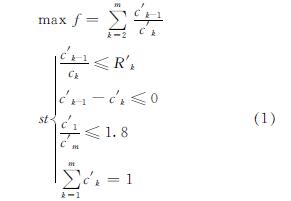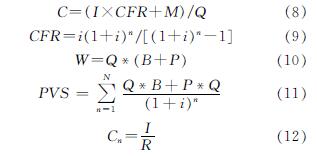基金项目:陕西省自然科学基础研究基金面上项目(2020JM-494)
第一作者:黄 莺(1979—),女,博士,副教授,研究方向为土木工程建造与管理相关方面.E-mail:cch-by@163.com
(School of Civil Engineering, Xi'an Univ. of Arch. & Tech., Xi'an 710055, China)
BIPV; post-evaluation; improved order relation method; cloud model; evaluation matrix
DOI: 10.15986/j.1006-7930.2022.05.006
随着全球经济的快速发展,能源的需求在不断增加[1],对传统能源开发利用,不仅会面临能源枯竭而且会造成全球气候变暖、海平面上升、雾霾等环境问题[2].全国人大代表陈康平认为,在双碳目标的驱动下,“十四五”期间,我国可再生能源占比将越来越高[3].中国建筑节能协会发布关于建筑领域能源消耗和碳排放数据的报告,2018年建筑领域碳排放总量近50亿t,超过总量的一半.因此,只有设法降低建筑能耗,减少建筑碳排放,才能最大程度推动碳达峰和碳中和两个目标的实现,并且报告还指出通过“增强建筑自身产出电能的能力; 实现建筑的电力能源系统完全由可再生能源产电”两种途径对实现建筑碳中和目标的贡献最大,是建筑领域实现碳达峰和碳中和两个目标的重要途径[4].考虑到太阳能资源丰富、清洁等优点以及建筑广阔的屋顶和外墙,通过将光伏发电与建筑建材结合,实现“光伏建筑一体化”(BIPV),势必成为建筑走可持续发展道路的最优选择[5].
光伏建筑一体化是应用太阳能发展的一种新概念,因其具有绿色节能,减少碳排放,提升建筑美学、提高用电效率、节约土地资源、保护生态环境等优势而受到推崇[6].但由于光伏属于新兴能源,人们对其运营效果及收益模式尚未充分了解,导致其在建筑上的应用发展存在一定的争议,其发展速度远未实现预期的速度.因此有必要对太阳能光伏建筑一体化系统应用效果进行评价研究,为光伏建筑产业加快发展提供动力支持.
目前对光伏建筑一体化的研究主要集中在采用灰色理论、模糊集及粗糙集理论等方法对系统的技术、经济性、环境效益等方面进行评价,而针对BIPV系统项目后评价的研究较少,如:Rehman等[7-11]从光伏建筑的系统装机容量、单位造价、能量回收期等方面对系统的经济性进行分析,构建经济优化数学模型; Stephen Berry, David Whaley[12]以南澳公园绿色村庄为研究对象,通过研究太阳能辐射发电量、系统效率、高峰需求管理等来表明光伏系统对家庭住宅的贡献及额外收益.Moien A. Omar[13-14]以运行了一段时间的光伏建筑系统为研究对象,对其运行的数据进行测量,通过对年、月、日产量等主要参数的计算,分析系统的技术性能,引入成本最小化和效用最大化模型,说明系统的经济可行性; 徐伟等[15]构建基于模糊层次分析法的光伏建筑综合效益评价模型,根据隶属度最大原则对光伏项目进行综合效益评价; 闫晓丽[16]通过分析BIPV系统的组成、分类、应用形式、性能影响因素,以层次分析法与灰色理论评价方法构建了BIPV综合评价体系; 张垚[17]基于全寿命周期, 构建光伏建筑一体化综合评价指标体系,对系统进行综合评价.夏麟、田炜等[18]以太阳能光伏系统为例,对运行数据进行分析,从发电量、光伏转换效率、发电量与太阳总辐射量关系、最大发电功率与最低用电功率的关系及经济性几方面全面评估了光伏系统的设计应用效果,对光伏系统进行后评价研究.
通过梳理相关文献后,针对BIPV项目现有研究的不足,本文以公共建筑光伏系统项目为对象,结合项目自身特点及相关标准和研究从发电性能、经济性能、环境、运营与维护四个维度对BIPV系统进行单项后评价,根据单项评价因素选取评价指标,利用改进序关系法计算指标权重,使得综合评价指标体系及权重计算更合理; 依据实际运行情况得出定量指标评价值并进行量化处理得到云参数值,采用云模型代替隶属函数得出定性指标云参数值,进而对评价矩阵进行改进,最后利用云滴的形式反映评价等级,使得结果更直观.通过对公共建筑BIPV系统项目进行后评价研究,提出相应改进意见,以期为类似项目提供参考.
由传统的序关系法计算得到的权重存在主观性较强,不能较好利用数据自身客观规律等缺点[19],对序关系法进行一些改进,使得权重的选取客观与合理.
(1)传统序关系法容易出现非相邻指标权重之比超出Rk取值范围的情况,如:当(w1)/(w2)=1.6且(w2)/(w3)=1.4时,(w1)/(w3)=2.24>1.8,影响综合评价结果的可靠度.因此,对方法进行如下改进.
(2)选择与αk最接近的值作为新的赋值R'k,其中:αk=(ck-1)/(ck),k=m,m-1,…,2,ck为指标的贡献度.
(3)求各指标的贡献度c'k,为了尽量拉开各指标的贡献度值,以相邻2个指标的贡献度之商最大为目标函数,进行约束为

(4)对模型(7)求解可得到c'k,则各指标的权重为

云模型是由我国学者李德毅院士提出的一种能够反映定性与定量之间的过渡,弥补传统概率论和模糊数学不足的一种发生器算法[20].目前云模型已经在风险、环境、安全等方面广泛应用,但将其运用到后评价中的较少.结合公共建筑BIPV系统项目自身特点,将云模型运用到其后评价中.
由标准云计算公式可得项目评价等级区间以及对应的云模型特征参数[21],见表1.
结合各评价等级的云参数值,运用MATLAB软件绘制标准评价云图,如图1所示; 该图从左到右对应的评价等级依次是“较差”、“一般”、“良好”、“优秀”.
对定性指标和定量指标所对应的评价值分别进行量化处理,构建基于云模型的评价矩阵X.对于定量指标,将计算得到的数据经无量纲化处理后得到评价值Q,相应的云参数值为Q→C=(Q,0,0).对于定性指标,邀请相关专家在单项评价基础上进行判断打分,然后根据虚拟云算法计算隶属云集.
定量指标无量纲化为

定性指标计算公式为

组合定性与定量评价云,得到评价矩阵

结合改进序关系法计算得到的权重矩阵W,可得最终评价结果为:Z=X×W=(Ex,En,He)T.利用MATLAB软件绘制综合评价云图,与标准云图进行对比,得出评级结果.
合理的评价指标体系的建立是项目后评价成功的基石,建立科学合理的公共建筑BIPV系统项目后评价指标体系应在明确项目类型,目的和实际产生影响的基础上,结合评价项目自身特点及指标体系构建的原则建立.由于BIPV组件兼具发电、装饰和建材的功能,不应以发电性能作为唯一考量标准; 发展和利用BIPV目的在于发挥自身高效、经济、环保等优势,进而促进节能减排、能源高效利用,但由于其造价相较于一般建筑而言较高,在进行后评价时应充分考虑其经济性以及对环境效益方面的考量; 由于系统性能受多因素影响,在进行BIPV系统项目后评价时不能忽视对系统运营与维护的考虑,日常的运维能够有效避免因设备质量、老化、组件清洗不及时造成供电稳定性差等问题; 下面对所选取的四个方面分别进行分析和说明.
光伏系统发电量及发电效率是评价其发电性能的重要性指标,也是公共建筑BIPV系统项目后评价的基础,而太阳能资源的丰富度,BIPV系统设计与配置对其发电能力起关键作用[22].因此在评价系统的发电性能时,首先用Autodesk Ecotect Analysis软件对太阳辐射量进行模拟,与实际的太阳辐射量进行对比,说明太阳能资源概况; 然后根据太阳能资源分布情况对系统配置进行分析,评价系统配置的合理性; 最后利用PVsyst软件对系统发电量进行模拟,将模拟发电量与实际发电量比较,并计算实际发电量所占整个建筑物用电量的比例,即建筑光伏用电占比[23],评价系统的发电能力.其中,建筑光伏用电占比计算公式为
G=Q/P (7)
式中,G为建筑光伏用电占比; Q为年均实际发电量; P为年均用电量;
光伏系统的经济性直接决定着光伏建筑一体化能否大规模地快速发展[8],而光伏建筑的经济效益是其经济性能最直观的体现,可以用光伏系统的度电成本和生命周期经济效益折现值来描述; 光伏系统经济可持续性也可间接反映其经济性能,其可持续性可通过综合分析计算得到的各项费用来体现; 综上对公共建筑BIPV系统项目进行经济性能评价时主要从系统的度电成本、生命周期经济效益折现和经济可持续性发展三个方面分析,各费用计算公式如下.

式中:C为度电成本; I为初始总投资; n为项目寿命期; i取8%; CFR为等额资金回收系数; Q为年均实际发电量; M为年运维费; W为年经济效益; P为工商业电价; B为国家财政补贴; PVS为生命周期经济效益折现值; Cn为光伏系统单位造价; R为光伏系统装机容量;
传统发电方式不仅加大建筑能耗,还会产生CO2、SO2、NOx及粉尘等污染物,对环境造成巨大的威胁[24].而BIPV将太阳能转化为电能时不会对大气造成影响,对BIPV系统项目进行环境效益评价时,不仅要考虑节能减排量,还需在计算环境效益后对环境可持续性进行分析.环境效益可通过计算光伏发电代替传统能源的节能减排量,结合单位减排系数及环境成本进行量化,其中单位减排系数及环境成本如表2所示; 环境可持续性则通过分析环境效益间接体现;
对光伏建筑一体化系统的运维管理,是保证光伏系统良好运行的重要保障.以往对BIPV系统进行评价时往往忽视对建成后实际运营与维护的评价,本文则通过是否定期对光伏系统中的线路进行检查与维护; 是否做到及时发现并解决问题; 是否配备监控系统和自动检测装置; 是否有清洗系统表面的设施或配备专业人员定期对系统进行清洗; 是否设专门检修服务部门,对工作人员定期培训等从维护检修、系统监测、系统清理、员工管理水平四个方面对系统运营与维护做出评价[16].
由于对BIPV系统单项后评价分析得到的评价结果存在一定的片面性,因此在其基础上建立公共建筑BIPV系统后评价指标体系,见表3,进行综合评价,使得对BIPV系统项目的后评价更全面.
将上述公共建筑BIPV系统后评价指标按定性和定量指标进行分类,评价标准参考《太阳能光伏与建筑一体化应用规程》、《太阳能光伏建筑应用系统评价标识管理办法》、《可再生能源建筑工程应用评价标准》、《绿色建筑评价标准》GB/T50378-2019等划分,如表4~5所示.此外,由于不同的BIPV系统都有着各自的特点,所以各指标的得分可以依据BIPV系统的实际应用情况进行修改和调整,使得评价结果更符合实际情况.
某公共建筑项目总建筑面积27 332.46 m2,其中地上建筑面积约21 009.83 m2,地下建筑面积约6 322.63 m2.地上21层,地下2层.该建筑中太阳能一体化光伏系统,主要采用260 Wp多晶硅电池组件,共安装180块,光伏组件南向安装在屋顶层铝质直立锁边屋面上,总安装面积约360 m2,总装机容量约为46.8 kW,光电转化效率为14%,采用一台33 kW的逆变器,其转化效率为98%.建设光伏系统初始总投资共计28.6万元,年运维费用约为4 000元,设计寿命25 a.
以该地区CSWD气象数据为基础,利用AUtodesk Ecodect Analysis软件进行太阳辐射模拟分析.由于本次模拟仅需分析建筑物外围太阳辐射情况,故只需依据其外围大致形状将其简化为多边体体块,进行全年平均太阳辐射量的模拟,得到太阳辐射彩色分布图,如图2所示:
根据太阳辐射彩色分布图可以看出,不同部位太阳辐射情况有较大的差别.建筑屋顶区域太阳辐射最强且辐射密度远高于各个立面,平均太阳辐射量达到4 236 MJ/m2,由实际监测计算知平均太阳辐射量为4 189 MJ/m2,与预期较一致,适合配置发电效率较高的多晶硅发电系统; 从上述分析可以看出该公共建筑在屋顶安装多晶硅光伏系统的配置方式较合理.
利用PVsyst软件对多晶硅光伏系统发电量进行模拟计算,将光伏组件性能参数及meteonorm 7.1气象数据库中气象数据参数输入软件,如图3所示.
利用PVsyst软件模拟得到多晶硅发电系统年发电量为4.12万 kWh,由监测系统得到实际年发电量为4.07万 kWh,模拟结果与实际结果基本吻合,验证了该光伏系统发电效能的准确性.由公式(7)可计算得到建筑光伏发电占比为:G=4.07/229.1=1.8%,得到其评价结果为“良好”.
由公式(8)(9)可计算得到系统的度电成本为C=(286 000×0.094+4 000)/40 700=0.76 元/kWh,得到其评价等级为“良好”.
生命周期经济效益折现值为PVS=∑Nn=1(40 700×0.4+1*40 700)/((1+8%))=534 600元,为初始总投资的1.87倍,得到其评级等级为“良好”.
由光伏系统的度电成本为0.76 元/kWh,单位造价为6.1 元/W,年经济效益为5.79万元,生命周期发电经济效益折现值为53.46万元,综合考虑以上各项费用,可以看出该公共建筑太阳能一体化光伏系统具有一定的经济可持续性.
由系统年发电量为4.12万 kWh,计算得到25年生命周期光伏系统发电总量为103万 kWh,2020年我国平均燃煤供电能耗约为306 g/kWh,则与燃煤发电方式相比,该系统在生命周期内可节约标准煤约315.25 t,结合表2可得该光伏发电系统污染物总减排量及环境效益,如表6所示.
由上表可以看出该系统生命周期内污染物排放量可以减少854.64 t,环境效益为0.95 元/kWh,说明该光伏系统具有一定的环境可持续性.
通过走访和深入调查知,在实际工作过程中,有专门检修部门定期对光伏系统中的线路进行检查与维护,并配有监控系统对系统进行监测,但存在对系统清理不到位且对员工的管理水平有限等问题,根据实际情况,与评价标准比较对项目的运营与维护做出评价.
根据虚拟云算法及专家打分得到定性指标隶属云集,对应云参数见表8.
定量指标无量纲化评价值及所对应的云参数值见表9.
表8 定性指标专家打分及对应云参数值
Tab.8 Qualitative index expert score and corresponding cloud model characteristic parameter value
表9 定量指标评价值及对应云参数值
Tab.9 Qualitative index evaluation value and corresponding cloud model characteristic parameter value
根据建立的计算模型得到综合评价的云参数为C(85.94,1.43,0.45),将计算结果输入正向云发生器,并利用MATLAB软件绘制综合评价的云图,如图4所示.
由上图可以看出该公共建筑光伏系统后评价等级介于“良好”与“优秀”之间,与“良好”云更加相似,则最终评价等级为“良好”.从各单项评价来看,系统发电能力和后期运营与维护方面有待提升,经济性能和环境效益都具有较好可持续性.根据综合评价值进行横向比较,发电性能>经济性能>环境效益及可持续性>运营与维护,各评价指标横向比较可以看出发电性能和经济性能占比较大,是公共建筑BIPV系统后评价的关键因素,运营与维护所占比重较小,但系统良好的运行离不开日常维护.因此在类似项目上可以在发电性能与后期运营维护方面重点提升与改善,例如探寻光伏电池新材料,提高光伏本身质量同时提高系统的转化效率,以期降低造价; 不仅仅考虑屋面光伏,也应考虑在太阳辐射较好的立面安装光伏幕墙,这样既能改善建筑围护结构热工性能,减少能耗,同时能降低建筑物整体造价进一步提高经济性能指标值; 项目在实施后多关注后期运营与维护,确保运营管理人员能切实履行运维职能,并且应定期对工作人员做相关的培训,提高相关人员的专业能力和素养等; 对于政府而言,应适时启动光伏建筑一体化推广计划,对于全部实现光伏建筑一体化应用的项目,给予优先保障土地供应、容积率奖励等政策支持,对采用“自发自用为主,余量上网”模式并网发电的,按实际发电量给予补贴,进而鼓励新建建筑开展光伏建筑一体化的应用,尤其是针对大型公共建筑的应用,加快编制标准体系制定相应规范; 搭建产业对接平台,促进光伏和建筑深度融合等.
(1)在参考相关文献并结合BIPV项目实际情况的基础上,确定了BIPV项目后评价的指标,构建了公共建筑BIPV项目后评价指标体系.由于影响BIPV实际运行情况的因素较为复杂,并且随着技术的进步可能会导致评价指标发生变化,需要有针对性地对评价指标体系进行完善.
(2)运用改进的序关系法进行指标权重的计算,能够减小人为主观因素影响,使得指标选取具有一定合理性,权重计算结果比传统序关系法更加客观、合理;
(3)将云模型运用于后评价中,对定性与定量指标分别进行量化处理,改进评价矩阵,使得评价结果更加准确,更好地实现指标与评价等级之间的可逆性转换; 利用云滴的形式反映评价等级,使得评价结果更直观.
(4)将改进的模型应用于某公共建筑光伏系统项目后评价研究中,得出其综合评价等级为良好,说明此项目还有进一步优化的空间.根据单项和综合评价有针对性的提出改进意见,为类似项目提供参考依据,进一步提高光伏建筑一体化应用效果,对光伏建筑的政策制定及可再生能源在公共建筑上的应用也具有一定的参考价值.